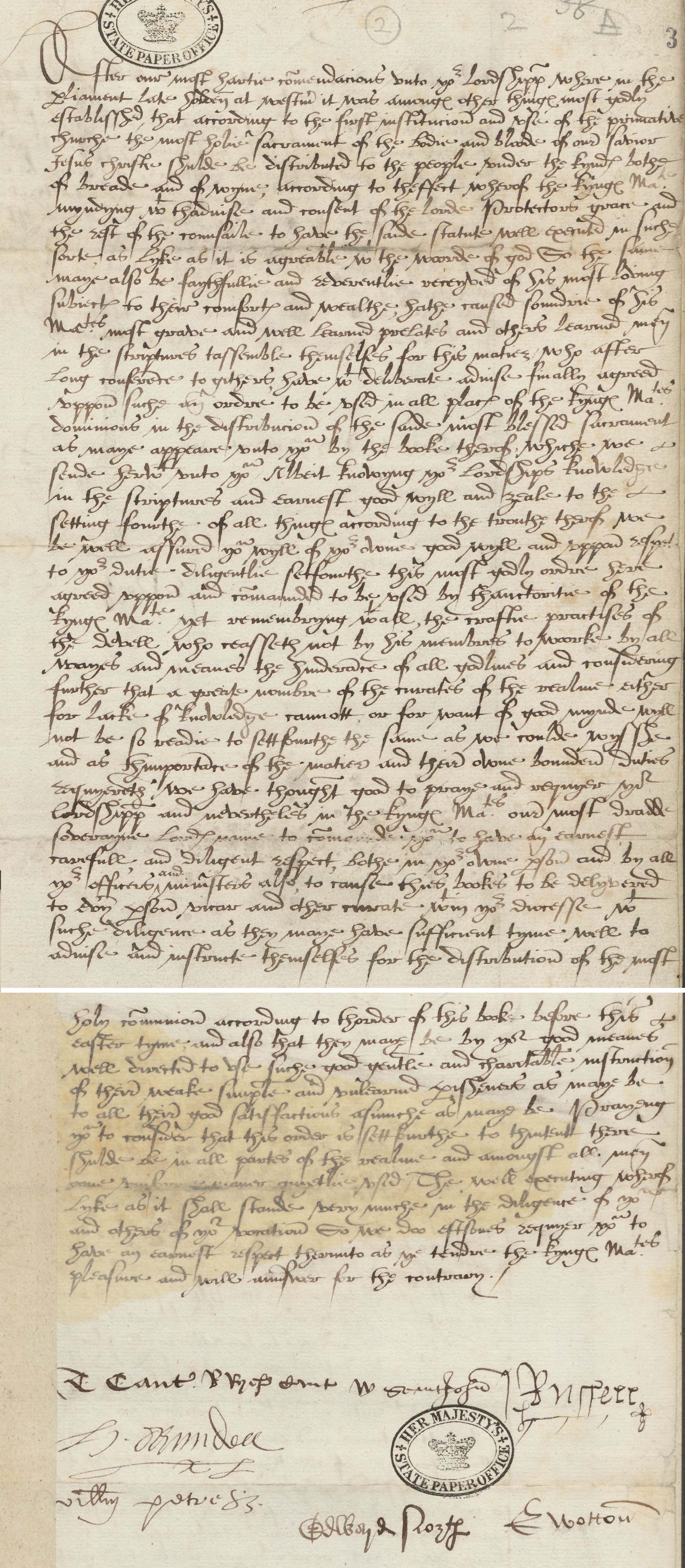
Letter from Privy Council to the bishops, 15 March 1548 (SP10/4/2, f.3r-3v)
This long, repetitious letter from the Privy Council is the first piece of evidence in the Edwardian state papers on religious reform. It enforced the new regime’s position on communion, laid out in the first statute passed in Parliament in 1547. It gave bishops little more than three weeks to ensure that ministers and curates were fully informed of the change in policy; prosecution under the Act could begin as early as 1 May. Note the language used to describe reform, the clergy and Edward’s subjects, as well as, how the council relates their own authority to that of the king’s.
Transcript
After our most hearty commendations unto your Lordship where in the parliament late held at Westminster it was among other things most godly established that according to the first institution and use of the primitive church, the most holy sacrament of the body and blood of our saviour Jesus Christ should be distributed to the people under the kinds both of bread and of wine;[1] According to the effect where of the king’s Majesty minding with the advice and consent of the Lord Protector’s grace and the rest of the council to have the said statute well executed in such sort as like as it is agreeable with the word of god. So the same may also be faithfully and reverently received of his most loving subjects to their comforts and wealth, hath caused sundry [various] of his Majesty’s most grave and well learned prelates and others learned men in the scriptures to assemble themselves for this matter who after long conference together have with deliberate advise finally agreed upon such an order to be used in all places of the king’s Majesty’s dominions in the distribution of the said most blessed sacrament as may appear unto you by the book there of, which we send here with unto you all be it knowing your Lordships knowledge in the scriptures and earnest good will and zeal to the setting forth of all things according to the truth. Thereof, we be well assured you will of your own good will and upon respect to your duty diligently set forth this most godly order here agreed upon and commanded to be used by the authority of the king’s Majesty yet remembering with all the crafty practices of the devil who ceased not by his members to work by all ways and means the hindrance of all godliness and considering further that a great number of the curates of the realm either for lack of knowledge cannot or for want of good mind will not be so ready to set forth the same as we could wish and as the importance of the matter and their own bounded duties required. We have thought good to pray and require your lordship and nevertheless in the king’s Majesty our most dread [someone to be awed] sovereign Lord’s name to command you to have an earnest careful, and diligent respect, both in your own person and by all your officers and ministers also, to cause these books to be delivered to every parson, vicar and other curate within your diocese with such diligence as they may have sufficient time well to advise and instruct themselves for the distribution of the most
[f.3v]
holy communion, according to the order of this book before this Easter time [i.e. 4 April]. And also that they maybe by your good means well directed to use such good gentle and charitable instruction of their weak simple and unlearned parishioners as maybe to all their good satisfactions as much as maybe praying you to consider that this order is set forth to the intent there should be in all parts of the realm and amongst all men one uniform prayer quietly used. The well executing where of like as it shall stand very much in the diligence of you and others of your vocation So we do … require you to have an earnest respect there unto as ye tender the king’s Majesty’s pleasure and will answer for the contrary.
[Signed by Thomas Cranmer, archbishop of Canterbury; Lord Rich; Lord St John; Lord Russell; the earl of Arundel; Sir William Petre; Sir Edward North, and Sir Edward Wotton]
[1] Edward VI’s Act: Against such as shall un-reverently speak against the sacrament of the body and blood of Christ, commonly called the sacrament of the altar, and for the receiving there of in both kinds.
